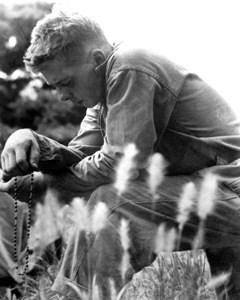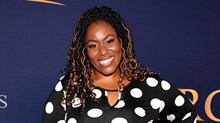
On September 16, The New York Times Magazine ran an exploration of prayer under the title, "Is There a Right Way to Pray?" In search of an answer to the title question, contributor Zev Chafets, a self-identified non-pray-er, visited the Brooklyn Tabernacle, a professional spiritual director in Manhattan, the rabbi half of the "God Squad," a Catholic theologian, and an Assemblies of God church outside Berkeley Springs, West Virginia.
Chafets received guidance as varied as "just sit and ponder," "give Jesus a big hand," "thank who or what seems appropriate," and, at The Brooklyn Tabernacle, complete directions for body and soul: "Let God begin the conversation. Keep your prayers brief and clear. Repeat simple Scripture-based phrases. Pray standing up to fight torpor. And pray directly facing others, eye to eye, in a loud, clear voice." He was most drawn to … well, you should read the article to find out.
Chafets' investigation sent me on a brief jaunt of my own—not to New York and America's first spa (I'm way too behind on grading to be traveling just now), but to the Christian Classics Ethereal Library. I didn't set myself a search agenda, hoping, like the reporter, to end up at least one place I hadn't expected to go.
The varied historical figures who popped up on my keyword search offered advice that overlapped very little with what Chafets heard but, to my surprise, they echoed each other across time and tradition. They asserted that prayer is rather simple, and it really is about asking for stuff.
CCEL first sent me to Charles Haddon Spurgeon, a 19th century British Baptist known as the "Prince of Preachers." In a reflection on Ezekiel 36:37, he wrote, "Prayer is always the preface to blessing. It goes before the blessing as the blessing's shadow. When the sunlight of God's mercies rises upon our necessities, it casts the shadow of prayer far down upon the plain."
The trigonometry of this illustration wasn't entirely clear to me, but I understood Spurgeon's next point: "Prayer is thus connected with the blessing to show us the value of it. If we had the blessings without asking for them, we should think them common things; but prayer makes our mercies more precious than diamonds." The relationship between necessity and mercy, request and blessing, might be mysterious, but it boils down to ask, receive, and give thanks.
For no obvious reason, CCEL next sent me to Justin Martyr, the author of the longest extant work of Christian apologetics from the second century. Justin mentioned prayer, almost in passing, as part of early Christian practice, including the "weekly worship of the Christians" (chapter LXVII).
And on the day called Sunday, all who live in cities or in the country gather together to one place, and the memoirs of the apostles or the writings of the prophets are read, as long as time permits; then, when the reader has ceased, the president verbally instructs, and exhorts to the imitation of these good things. Then we all rise together and pray, and, as we before said, when our prayer is ended, bread and wine and water are brought, and the president in like manner offers prayers and thanksgivings, according to his ability, and the people assent, saying Amen.
Nothing fancy there. And while Justin does not explain how the early Christians prayed, or what for, or what they expected as a result, it is clear from the context of the chapter that needs were central. At these basic, early church services, the wealthy helped the needy, and food and other resources were collected for distribution to widows, orphans, the sick, the poor, the enslaved, and strangers. Surely a community so attentive to needs also understood prayer as an expression of want bearing a promise of relief.
Next on the CCEL's serendipitous lineup was Madame Guyon, a French mystic of the 17th and 18th centuries who was condemned by the Catholic church for Quietism. At its extreme, Quietism advocates stoicism, passivity, and absorption of the self into the Divine. Guyon seems to have avoided these extremes, instead running afoul of church authorities for her Protestant-seeming emphasis on salvation by grace rather than works. The book that got her into trouble, A Short and Easy Method of Prayer, began with a harmless enough invitation: "Prayer is the application of the heart to GOD, and the internal exercise of love. S. Paul hath enjoined us to ‘pray without ceasing' (1 Thess. v 17), and our Lord saith, ‘I say unto you all, watch and pray' (Mark xiii. 33, 37): all therefore may, and all ought to practice prayer." A bit further on she wrote, "Nothing is so easily obtained as the possession and enjoyment of GOD, for ‘in him we live, move, and have our being;' and He is more desirous to give Himself into us, than we can be to receive Him."
Guyon sounded somewhat Protestant, specifically Wesleyan, on the possibility of Christian perfection, but I found her overall message simple and straightforward: Anyone can pray, and the benefits are abundant.
After reading Madame Guyon, I realized I'd skipped an entry on the CCEL results: John Calvin, who died about a century before Guyon was born. In chapter 20 of the Institutes, in typically methodical fashion, he set out four rules for prayer:
[1] to have our heart and mind framed as becomes those who are entering into converse with God … [2] that in asking we must always truly feel our wants, and seriously considering that we need all the things which we ask, accompany the prayer with a sincere, nay, ardent desire of obtaining them … [3] that he who comes into the presence of God to pray must divest himself of all vainglorious thoughts … [4] that notwithstanding of our being thus abased and truly humbled, we should be animated to pray with the sure hope of succeeding.
It's Calvin, so there's a lot of weighty material here, but points two and four repeated the exhortation of the other writers, namely to ask for what you need and expect to get it.
* * *
I wish I could be entirely satisfied with advice that has such longstanding and broad support, but I, like Chafets, am a creature of a different era, one in which, according to Stephen Waldman at Beliefnet.com (quoted by Chafets), "prayer has become its own religion." Enticed by SUV commercials, or chastened by tragedies, or just plain unmoored, many Americans focus on life's journey rather than its destination, which makes it difficult to embrace a concept of prayer that is resolutely results-oriented. The process of prayer—the sitting or clapping or loud, clear voice, even the philosophical task of projecting a nameless god—seems manageable. It makes sense, in that it fits on the daily to-do list. Additionally, process orientation carries a very sure hope of succeeding, because it defines success as completion of the process. But that isn't at all the kind of success Spurgeon, Justin, Madame Guyon, or Calvin hoped their readers would find. If only prayer were as easy as it is simple.
* * *
Image: Young Marine prays just before battle during the Korean War, 1951. Source: Marine Corps, Department of Defense, via Wikimedia Commons.

Support Our Work
Subscribe to CT for less than $4.25/month




























